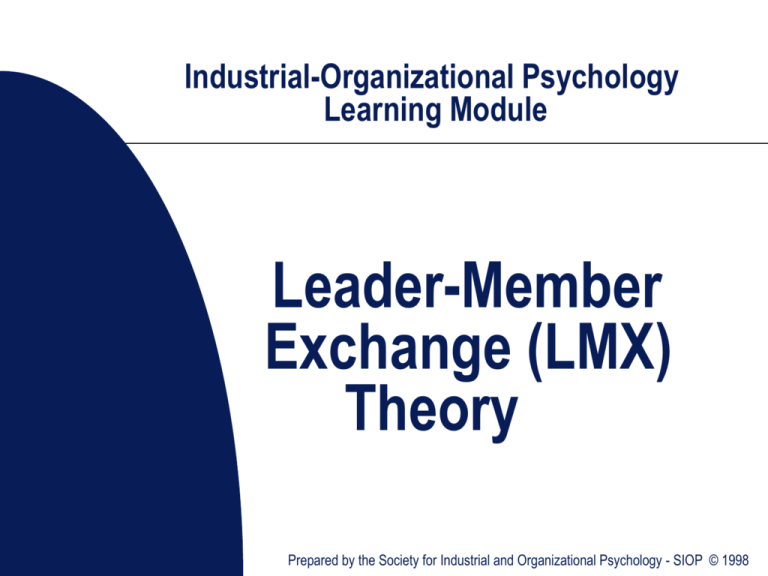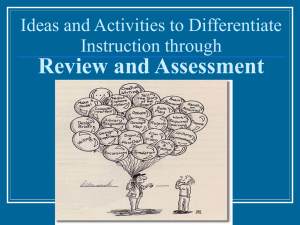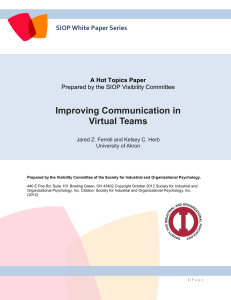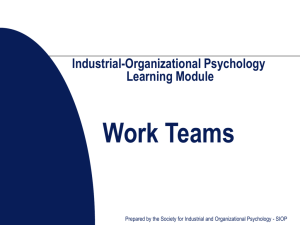LMX - Society for Industrial and Organizational Psychology
advertisement

Industrial-Organizational Psychology Learning Module Leader-Member Exchange (LMX) Theory Prepared by the Society for Industrial and Organizational Psychology - SIOP © 1998 Lesson Objectives At the end of this lecture, you should: Understand the elements of LMX theory Know the precursors and outcomes of LMX Know how gender influences fairness in LMX relationships Understand the role of perspective taking in LMX Prepared by the Society for Industrial and Organizational Psychology - SIOP © 1998 Leader-Member Exchanges Leaders develop relationships with each member of work group High quality relationship member is part of “in-group” more responsibility, higher satisfaction Low quality relationship member is part of “out-group” less responsibility, lower satisfaction Prepared by the Society for Industrial and Organizational Psychology - SIOP © 1998 Theoretical Overview of LMX Relationships develop from series of exchanges or interactions Phase 1: Role-taking member enters organization leader assesses member’s abilities/talents Phase 2: Role-making informal, unstructured negotiation of role Phase 3: Role-routinization social exchange pattern emerges becomes routine Prepared by the Society for Industrial and Organizational Psychology - SIOP © 1998 Precursors of LMX Member attributes influence relationship extroversion abilities ingratiation behaviors Leader provides social support Affective responses influence relationship perceived similarity attraction leads to increased interaction trust Prepared by the Society for Industrial and Organizational Psychology - SIOP © 1998 Outcomes of LMX Job satisfaction Organizational commitment Moderated/affected by other factors type of task matters level of challenge situational factors size of group workload financial resources Prepared by the Society for Industrial and Organizational Psychology - SIOP © 1998 Gender/Fairness and LMX Gender differences influence interactions Mixed gender relationships supervisors rate performance lower supervisors report liking subordinate less subordinates experience greater role ambiguity Opposite true in same gender relationships Prepared by the Society for Industrial and Organizational Psychology - SIOP © 1998 Gender/Fairness and LMX Process Phases 1: Role-taking - mutual respect essential men and women define respect differently social categorizing and stereotyping 2: Role-making - trust develops single violation may destroy relationship violations reinforce negative stereotypes 3: Role-routinization - mutual obligation gender/fairness issues resolved by this phase Prepared by the Society for Industrial and Organizational Psychology - SIOP © 1998 Perspective-Taking Ability to “read” leader or member important in LMX Use role-taking skills to entertain the point of view of another Associated with empathy, reasonableness, and sensitivity Negatively associated with aggressiveness and sarcasm Prepared by the Society for Industrial and Organizational Psychology - SIOP © 1998 Perspective-Taking I Questions When you were drawing, did you draw toward yourself or toward your partner? How do you think your score on the perspective-taking questionnaire might relate to your performance on this task? How do you think one’s tendency or ability to take the perspective (i.e., point of view) of another might influence the ways in which leaders and subordinates interact? Prepared by the Society for Industrial and Organizational Psychology - SIOP © 1998 Perspective-Taking II Questions How difficult was it for you to imagine drawing from your partner’s perspective? How do you think your score on the perspective-taking questionnaire might relate to your performance on this task? How do you think one’s tendency or ability to take the perspective (i.e., point of view) of another might influence the ways in which leaders and subordinates interact? Prepared by the Society for Industrial and Organizational Psychology - SIOP © 1998 Perspective-Taking Wrap-up 3 role-taking aspects related to perspective-taking accurate in ability to perceive how others understand and respond to world can view situations from many perspectives able to perceive other’s perspective in depth Leaders and members high on these aspects may have higher quality LMX Prepared by the Society for Industrial and Organizational Psychology - SIOP © 1998





